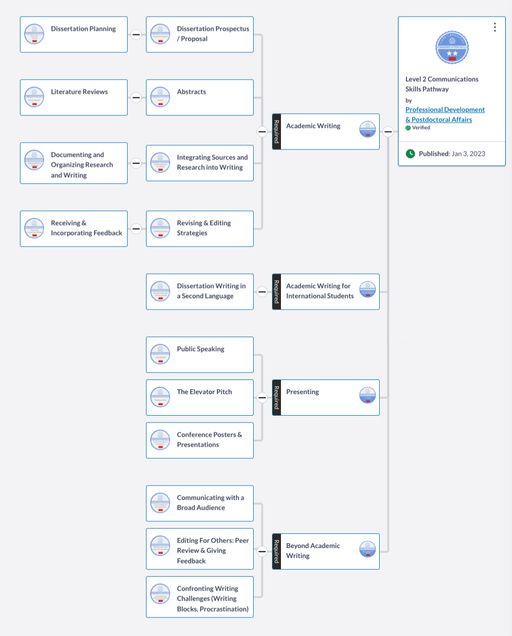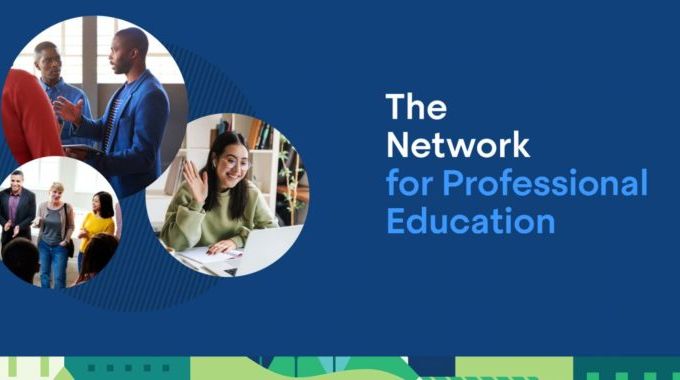PhD Progression
These are verified credentials from Boston University that say, “You have a leadership skill” and that’s something an employer can see and that’s a really meaningful thing. –Sasha Goldman, Director of Ph.D. Resources
Due to a variety of factors, including lack of interest, the majority of Ph.D. students today will not be receiving tenure-track positions at R1 universities post-graduation. Also, due to the primary focus on preparing graduate students for these positions in doctoral programs, many students lack the language of broader marketable skills, access to build these skills, and knowledge of how to articulate the skills to future employers.
“We were tasked with finding a way, not only to give them that language, but also to give them access to resources to help them build the skills and communicate about them when they are looking for jobs in the future,” Director of Ph.D. Resources Sasha Goldman said in an interview.

In response to this problem, Goldman and Assistant Provost and Assistant Vice President of Professional Development & Postdoctoral Affairs Sarah Hokanson, along with the Professional Development & Postdoctoral Affairs (PDPA) office, partnered with the Shipley Center to create PhD Progression, an online digital-badge tracking platform and dashboard that allows BU doctoral students to follow their development of skills and achievement of learning goals connected to the PhD Core Capacities. Through the acquisition of digital badges connected to activities and assessments recorded on the platform, doctoral students at BU are able to monitor their progress through various learning pathways, share benchmarks in their individual development plans, and develop a practice of career planning and lifelong learning.
This program supports our competency-based framework for PhD education at the university and allows students both the flexibility to complete professional development when they need to as well as a credential based on their work they can share with future employers. –Sarah Hokanson, Assistant Vice President and Assistant Provost
The goal of this project was to find a means to deliver quality professional development content to approximately 2,800 Ph.D. students at BU across 63 Ph.D. granting departments and programs, which span 14 schools and colleges and a variety of disciplinary fields.

To achieve this goal, the PhD Progression team ensured the content is relevant to students from their first year through their dissertation defense and satisfies a need for skill exploration, skill development, and skill application across the PhD Core Capacities. The content also demystifies the hidden curriculum of graduate school by providing students with answers to questions they often don’t know to ask. Overall, the system provides a mechanism to acknowledge the additional work that PhD students do towards developing as professionals, beyond the requirements of their degree program.
To execute this project, Goldman and Hokanson leveraged a micro-credentialing system, Canvas Credentials, to provide asynchronous resources for PhD students to engage in professional development that they’ve coupled with skill-based synchronous learning communities. They also provide a supplemental tool, Skillsmatch from Lightcast, that allows students an additional point of entry into their learning through a skill-inventorying tool that makes recommendations for badges to take, based on skills students want and need for their desired careers.
I've extensively utilized the pathways tool since I began planning my dissertation prospectus. It proved invaluable in crafting my Individual Development Plan (IDP) and establishing clear career goals for both the remainder of my Ph.D. journey and beyond. –Lizette Pizza, doctoral candidate
As a result, this project has enabled PDPA to expand its reach and delivery of professional development resources to PhD students across the University. Offering multiple modalities for students to engage in professional development has created a more inclusive, accessible means for PhD students to engage with these resources.
To date, they have awarded over 2,000 badges to PhD students at BU since they started this project in 2020 and currently have 850 PhD students enrolled.
“The results of the pilot program gave us some really compelling data and we used that data and the positive feedback that we got from students to do additional research, which allowed us to apply for a National Science Foundation Innovations in GraduateEducation (IGE) grant and we won that award in 2022,” Goldman said.
Through the NSF grant, the team is now able to add additional badges and work with industry and institutional partners to build a multi-institutional consortium that will support content sharing and resource development across partners. The team is also working to establish internships with local companies to assess whether the badges they’ve built with other industry partners fulfill their objective of preparing PhD students to enter the workforce with more ease and without the challenges typically faced by those transitioning from academia to industry.
“I hope this project can transform PhD education into a training experience that emphasizes continuous learning across a number of important professional skills, allowing students to be prepared for a wide range of job possibilities post-graduation,” Hokanson said. “I also envision that this program could eventually support students to continue to ‘up-skill’ post-graduation as they need to within their chosen career pathway.”
Through this initiative, BU is well-positioned as a leading institution in the space of graduate education for micro-credentialing. This program will facilitate student success in future career pathways by equipping them with the core skills for competitive job markets and communicating the value of lifelong, extracurricular learning.
Conferences, News & Publications
Gnangnon, B., Li, K., Rezaei, D. F., Marks, M. M., Dellarocas, C., Hokanson, S. C., & Goldman, S. B. (2024). PhD Progression: a micro-credentialing program motivates and supports PhD students’ professional development at a US University. Studies in Graduate and Postdoctoral Education.
Goldman, S.B. (2023). The case for digital badges for Ph.D.s. Inside Higher Ed.
Goldman, S.B. (2023). Badge of Honor: Boston University's Skills-Based Approach. Lightcast.io.
Project Team & Partners

Sasha B. Goldman is the Director for PhD Professional Development where she is responsible for overseeing the Core Capacities curriculum and PhD Progression digital-badging platform for doctoral student professional development at BU. Sasha is tasked with developing and coordinating regular programming, workshops, and trainings for…



